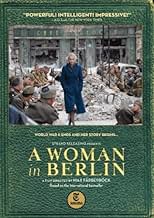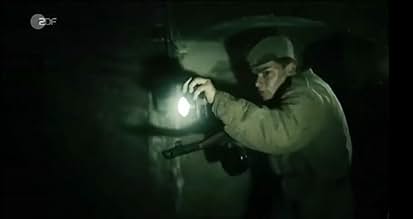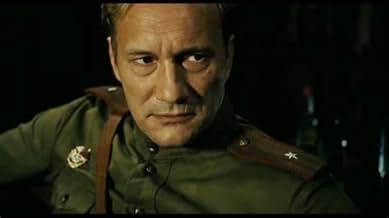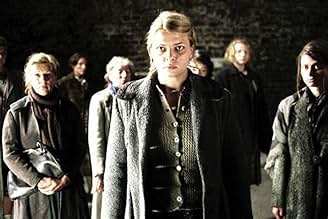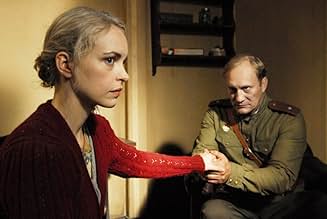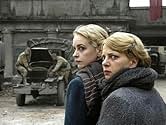IMDb रेटिंग
7.0/10
7.3 हज़ार
आपकी रेटिंग
अपनी भाषा में प्लॉट जोड़ेंA woman tries to survive the invasion of Berlin by the Soviet troops during the last days of World War II.A woman tries to survive the invasion of Berlin by the Soviet troops during the last days of World War II.A woman tries to survive the invasion of Berlin by the Soviet troops during the last days of World War II.
- निर्देशक
- लेखक
- स्टार
- पुरस्कार
- 1 जीत और कुल 4 नामांकन
Evgeniy Sidikhin
- Major Andreij Rybkin
- (as Evgeny Sidikhin)
Viktor Zhalsanov
- asiatischer Rotarmist
- (as Victor Zhalsanov)
फ़ीचर्ड समीक्षाएं
I haven't read the diary, but my father has and after we watched this together, he said that they got everything from the compelling book with its important testimony. This review is based upon the version with a two hour running time and six minutes of credits. After Berlin was taken over by Russian soldiers(among them men who had not had sex for four years) at the end of WW2, and raped 100.000 women, leading to the death of 10.000 of them. When this was first revealed in the late 50's, the truth outraged many in the country. It was called an attack on the virtue of female Germans. Fortunately, it was re-released in 2003, and now this excellent adaptation has hit theaters. There is apparently also a longer cut, and if the standard of this is maintained, it is undoubtedly great and worth it. This is gripping from start to finish. It all comes across as real and authentic(helped by the fact that they speak the three languages they are supposed to), and since this is entirely objective and doesn't take any sides in the conflict, you feel for both groups. The acting performances are spot-on. This has some marvelous little touches and details, and it is historically accurate. The characters are complex and psychologically credible. This is immensely well-produced. The camera-work and editing put you right in the situation when this fits, and is in general expertly done. This has extraordinary lighting. There are a few light portions that keep it from being all sad(without it taking away from how touching and engaging the rest of it is). It is tense and unpleasant when it means to be, albeit it isn't outright depressing. The atmosphere is built up well. There is a bit of moderate sexuality, nudity of both genders, brutal violence and disturbing content in this. The DVD comes with a trailer for this and ones for other films. I recommend this warmly to everyone mature enough for it. What happened should never be forgotten. 8/10
War is not a pleasant experience. Those who follow the news know that there have been several of our own soldiers accused and prosecuted for rape and murder in Iraq. In all wars there are local citizens who prostitute themselves to feed their family. It is often hard to make a choice between honor and survival.
This is the story of German women at the end of WWII when the Russians have moved into Germany. They are, of course, raped and abused, as women often are by invading armies. The question then becomes, how best to survive. Anonyma (Nina Hoss) decides the best way is to find the best Russian officer to care for her in exchange for sex.
It is easy to see why the Germans and the Russians hated the book, upon which this film is based, when it came out after the war. They are not shown in a good light. That is no surprise. Soldiers usually do not come from Ivy League universities, but from farms and shops.
Nina Hoss is one of the very few women that can look splendid even in rags.
Oustanding film.
This is the story of German women at the end of WWII when the Russians have moved into Germany. They are, of course, raped and abused, as women often are by invading armies. The question then becomes, how best to survive. Anonyma (Nina Hoss) decides the best way is to find the best Russian officer to care for her in exchange for sex.
It is easy to see why the Germans and the Russians hated the book, upon which this film is based, when it came out after the war. They are not shown in a good light. That is no surprise. Soldiers usually do not come from Ivy League universities, but from farms and shops.
Nina Hoss is one of the very few women that can look splendid even in rags.
Oustanding film.
rape is the particular plight of women during war and acknowledged at long last as a war crime.The plight of German women at the end of WW II was especially awful as they had protection from no one. General Eisenhower who punished rape committed by his men with execution outside of Germany (first rape took place six hours after invasion of Normandy had begun)but as for German women all men had free hands as these women were all declared "willing". The Americans are the only ones to have gone through archives as for army rape in WW II however the one recent book existing is not allowed for publishing in the US because of the war in Iraq (!!)so exists in French version only. The French and the British have preferred to turn a blind eye to what was done by their soldiers towards German women let alone the Russians. It is very important that this film has been made at long last. Subject concerns all not just its victims let alone the children born out of the horrors. Bravo Germany.
10hasosch
Max Färberböck, known to the world-wide audience since his "Aimee and Jaguar", shows in this newer film for once not the standard story of the bad Germans, who, deserving after what they have done, being Nazis, are liberated by the good Russians, the good Americans and the good Allies. It shows exactly the same experience that we all, who grew up in the East Block, had about our Russiand "friends". They came to rape, to destroy, to violate, to erase. It is a very interesting fact concerning mass psychology or perhaps better mass-psychosis that nobody normally speaks about the enormous amount of destruction done or caused by the liberators of end-World War II Europe. And nobody even mentions the Stalinist concentration camps. This is why we need films like "Eine Frau In Berlin".
However, in Färberböcks film, we see the Russians, "like animals, like pigs, an-alphabets, without culture" - as the Russian Major says it in his own words, he, who speaks, according to the main female character "a seldomly high-style Russian". Well, a little bit of "justness" had to be - not ALL Russians are like the "scum" (quotation from the movie) that we see. Interestingly, my Hungarian home-town had been bombed by Americans, but afterward the Russians came like vultures and pitched themselves into the ruins, what was female, was raped, what had been church or synagogue - was emptied and the treasures stolen, a subculture sneaking from the sou-terrain up to the ruins and even profiting from corpses and debris.
However, in Färberböcks film, we see the Russians, "like animals, like pigs, an-alphabets, without culture" - as the Russian Major says it in his own words, he, who speaks, according to the main female character "a seldomly high-style Russian". Well, a little bit of "justness" had to be - not ALL Russians are like the "scum" (quotation from the movie) that we see. Interestingly, my Hungarian home-town had been bombed by Americans, but afterward the Russians came like vultures and pitched themselves into the ruins, what was female, was raped, what had been church or synagogue - was emptied and the treasures stolen, a subculture sneaking from the sou-terrain up to the ruins and even profiting from corpses and debris.
A Woman in Berlin (2008)
Imagine the horrors of women caught in a large city during the chaos of war, with occupying troops storming your apartment building day after day. Well, think again. It isn't imaginable. I think even people who live through such things (and we are talking Berlin, 1945 for this movie) the truth is something that is pushed away. Because even watching a movie--a movie!--of these events is unbearable.
Not that the movie is unwatchable. Just the opposite. It's beautifully made, seeming to parallel that other recent German movie about the last days of the Nazi reign, "Downfall," 2004. But unlike that movie, this isn't about political history, or the history of war, or even the dramatization of historical figures as real people. This is a personal story, centering around one woman played by Nina Hoss, and about the repeated rape and abuse of women by the Russian troops for days and weeks on end. There was no escape, no power to complain to, no justice anywhere, anywhere, not German or Russian or even American (assuming they were any better) a mile or two away.
The movie is based on a book, "Anonyma," by a woman whose identity is not revealed, if it is even known (this was her protection even after death). The movie suffers now and then from a sameness, a steady pounding, beginning to end. The parade of horrors is continuous even as relationships develop and the first wave of anarchistic occupiers shifts to more entrenched troops and some general partying. You do cling to some semblance of progression, or of events to stand out from the others, but it's mostly about horribleness.
But maybe that's the way it should be. It was an endless nightmare on every level, even if you (they, these women) survive. In some ways, the end of the war is more believably insane here than in "Downfall" even though they are in many ways comparable movies, comparable moments. Such an array or gritty, believable acting and sets you won't find often. And thankfully, even the sentimental aspects are handled without swelling music and other cinematic tricks found too often this side of the Atlantic.
One last point, whatever you think of the Germans and WWII, here is yet another kind of national acknowledgment and, for many, soul-searching. This is a German film. The Russians don't come off great, for sure, but the Germans are clearly at fault, and are shown that way, and shown as responsible for even greater crimes. There's no glossing over any of it. Watch this movie. It won't be fun, but it'll be stirring and important.
Imagine the horrors of women caught in a large city during the chaos of war, with occupying troops storming your apartment building day after day. Well, think again. It isn't imaginable. I think even people who live through such things (and we are talking Berlin, 1945 for this movie) the truth is something that is pushed away. Because even watching a movie--a movie!--of these events is unbearable.
Not that the movie is unwatchable. Just the opposite. It's beautifully made, seeming to parallel that other recent German movie about the last days of the Nazi reign, "Downfall," 2004. But unlike that movie, this isn't about political history, or the history of war, or even the dramatization of historical figures as real people. This is a personal story, centering around one woman played by Nina Hoss, and about the repeated rape and abuse of women by the Russian troops for days and weeks on end. There was no escape, no power to complain to, no justice anywhere, anywhere, not German or Russian or even American (assuming they were any better) a mile or two away.
The movie is based on a book, "Anonyma," by a woman whose identity is not revealed, if it is even known (this was her protection even after death). The movie suffers now and then from a sameness, a steady pounding, beginning to end. The parade of horrors is continuous even as relationships develop and the first wave of anarchistic occupiers shifts to more entrenched troops and some general partying. You do cling to some semblance of progression, or of events to stand out from the others, but it's mostly about horribleness.
But maybe that's the way it should be. It was an endless nightmare on every level, even if you (they, these women) survive. In some ways, the end of the war is more believably insane here than in "Downfall" even though they are in many ways comparable movies, comparable moments. Such an array or gritty, believable acting and sets you won't find often. And thankfully, even the sentimental aspects are handled without swelling music and other cinematic tricks found too often this side of the Atlantic.
One last point, whatever you think of the Germans and WWII, here is yet another kind of national acknowledgment and, for many, soul-searching. This is a German film. The Russians don't come off great, for sure, but the Germans are clearly at fault, and are shown that way, and shown as responsible for even greater crimes. There's no glossing over any of it. Watch this movie. It won't be fun, but it'll be stirring and important.
क्या आपको पता है
- ट्रिवियाThe movie's source novel is the diary of an unnamed woman, called Anonyma, from April 29, 1945 to June 22, 1945.
- गूफ़When Germany's surrender is announced, the Soviet troops start singing the "Alexandrov version" of their national anthem, adopted about a year earlier. That version had no lyrics until Stalin intervened, and the heavy fighting wouldn't have allowed the soldiers to learn them. They most likely sang the chorus of "The Internationale," an earlier, better-known version.
- कनेक्शनFeatured in History: Anonyma - Die Frauen von Berlin (2010)
टॉप पसंद
रेटिंग देने के लिए साइन-इन करें और वैयक्तिकृत सुझावों के लिए वॉचलिस्ट करें
- How long is A Woman in Berlin?Alexa द्वारा संचालित
विवरण
- रिलीज़ की तारीख़
- कंट्री ऑफ़ ओरिजिन
- आधिकारिक साइट
- भाषाएं
- इस रूप में भी जाना जाता है
- Anónima - Una mujer en Berlín
- फ़िल्माने की जगहें
- उत्पादन कंपनियां
- IMDbPro पर और कंपनी क्रेडिट देखें
बॉक्स ऑफ़िस
- US और कनाडा में सकल
- $2,94,014
- US और कनाडा में पहले सप्ताह में कुल कमाई
- $12,439
- 19 जुल॰ 2009
- दुनिया भर में सकल
- $18,63,939
- चलने की अवधि
- 2 घं 11 मि(131 min)
- रंग
- ध्वनि मिश्रण
- पक्ष अनुपात
- 2.35 : 1
इस पेज में योगदान दें
किसी बदलाव का सुझाव दें या अनुपलब्ध कॉन्टेंट जोड़ें



